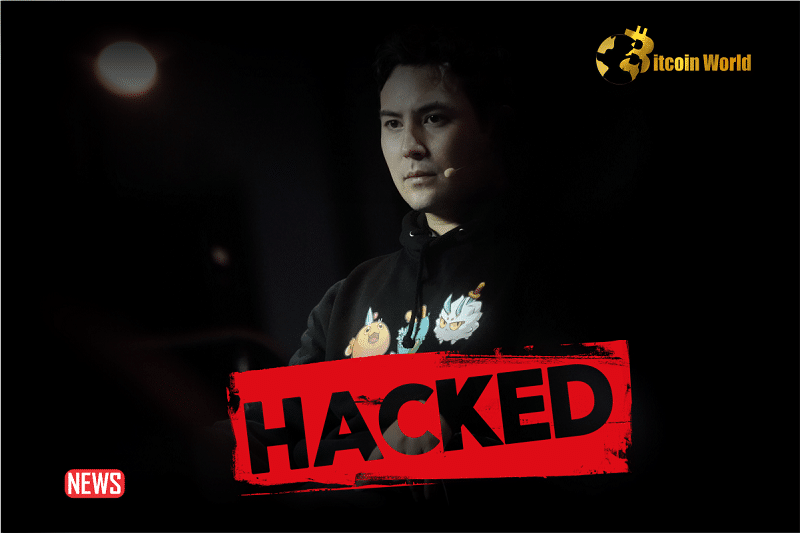The crypto world never sleeps, and unfortunately, neither do the hackers. Jeff “Jihoz” Zirlin, the co-founder of Axie Infinity, recently experienced a significant setback. Two of his personal crypto wallets were compromised, resulting in the loss of a staggering $9.7 million worth of Ethereum (ETH). Let’s dive into the details of this breach, the reactions, and what it means for the security of crypto assets.
What Happened to Jihoz’s Wallets?
On February 23rd, blockchain investigator PeckShield raised alarms about a potential compromise affecting a “whale wallet” connected to the Ronin Bridge. The initial report indicated that 3,248 ETH had been siphoned off by the hacker.
Here’s a breakdown of the key events:
- Initial Alert: PeckShield detects suspicious activity on the Ronin Bridge involving a large ETH withdrawal.
- Confirmation: Jeff “Jihoz” Zirlin confirms that two of his personal wallets were indeed compromised.
- Stolen Amount: Approximately $9.7 million worth of ETH was stolen from Zirlin’s wallets.
- Investigation: Preliminary findings suggest a “wallet compromise” as the root cause, implying a leak of private keys.
- Fund Movement: The stolen ETH was split and moved to multiple wallets before eventually landing in Tornado Cash, a crypto mixer.
The Response: Security Measures and Reassurances
Following the incident, Aleksander Larsen, another co-founder of Ronin Network, was quick to emphasize the robust security of the Ronin Bridge itself. He highlighted that the bridge has undergone audits and is designed to automatically pause if it detects unusually large withdrawals.
Zirlin also reassured the community, stating that the attack was not due to vulnerabilities within the Ronin chain or Sky Mavis operations. He emphasized the strict security measures in place for all chain-related activities.
Wallet Compromise: What Does It Mean?
PeckShield’s assessment points to a “wallet compromise” as the primary cause of the hack. This typically indicates that the private keys associated with Zirlin’s wallets were exposed, allowing the hacker to gain unauthorized access and transfer funds.
While the exact details of how the private keys were leaked remain unclear, it underscores the critical importance of secure key management practices. Here are some potential causes of private key compromise:
- Phishing Attacks: Tricked into revealing private keys through deceptive emails or websites.
- Malware: Keyloggers or other malicious software installed on a compromised device.
- Unsecured Storage: Storing private keys in plain text on a computer or in an unencrypted file.
- Compromised Devices: Using a device that has been previously compromised by malware.
The Hacker’s Trail: Obfuscation Tactics
After gaining control of the funds, the hacker employed several tactics to obscure the trail and anonymize the stolen ETH. The funds were initially split and transferred to three different wallets before ultimately being deposited into Tornado Cash, a popular crypto mixer service.
Lessons Learned and Security Best Practices
This incident serves as a stark reminder of the ever-present risks in the crypto space. While security measures at the network and bridge level are crucial, individual wallet security remains paramount. Here are some key takeaways:
- Secure Key Management: Use hardware wallets or other secure methods to store private keys offline.
- Be Wary of Phishing: Exercise caution when clicking on links or opening attachments from unknown sources.
- Regular Security Audits: Conduct regular security audits of your systems and wallets.
- Multi-Factor Authentication: Enable multi-factor authentication (MFA) wherever possible.
- Stay Informed: Keep up-to-date on the latest security threats and best practices.
Binance’s Recovery Efforts: A Contrasting Example
Interestingly, this incident contrasts with a recent case involving Ripple co-founder Chris Larsen, where $112 million worth of XRP was stolen. In that instance, the hacker did not utilize crypto mixer services, allowing Binance to freeze $4.2 million worth of the stolen funds.
This highlights the importance of hacker behavior in determining the success of recovery efforts. The use of mixers like Tornado Cash significantly complicates the process of tracking and recovering stolen funds.
Conclusion: Vigilance is Key
The hack of Jeff “Jihoz” Zirlin’s wallets is a sobering reminder of the risks inherent in the crypto world. While the Ronin Network and Sky Mavis have emphasized their commitment to security, this incident underscores the importance of individual responsibility in safeguarding crypto assets. By adopting secure key management practices, staying vigilant against phishing attacks, and keeping abreast of the latest security threats, individuals can significantly reduce their risk of becoming a victim of crypto theft.
Disclaimer: The information provided is not trading advice. Bitcoinworld.co.in holds no liability for any investments made based on the information provided on this page. We strongly recommend independent research and/or consultation with a qualified professional before making any investment decisions.
#Binance #WRITE2EARN
Disclaimer: The information provided is not trading advice, Bitcoinworld.co.in holds no liability for any investments made based on the information provided on this page. We strongly recommend independent research and/or consultation with a qualified professional before making any investment decisions.




